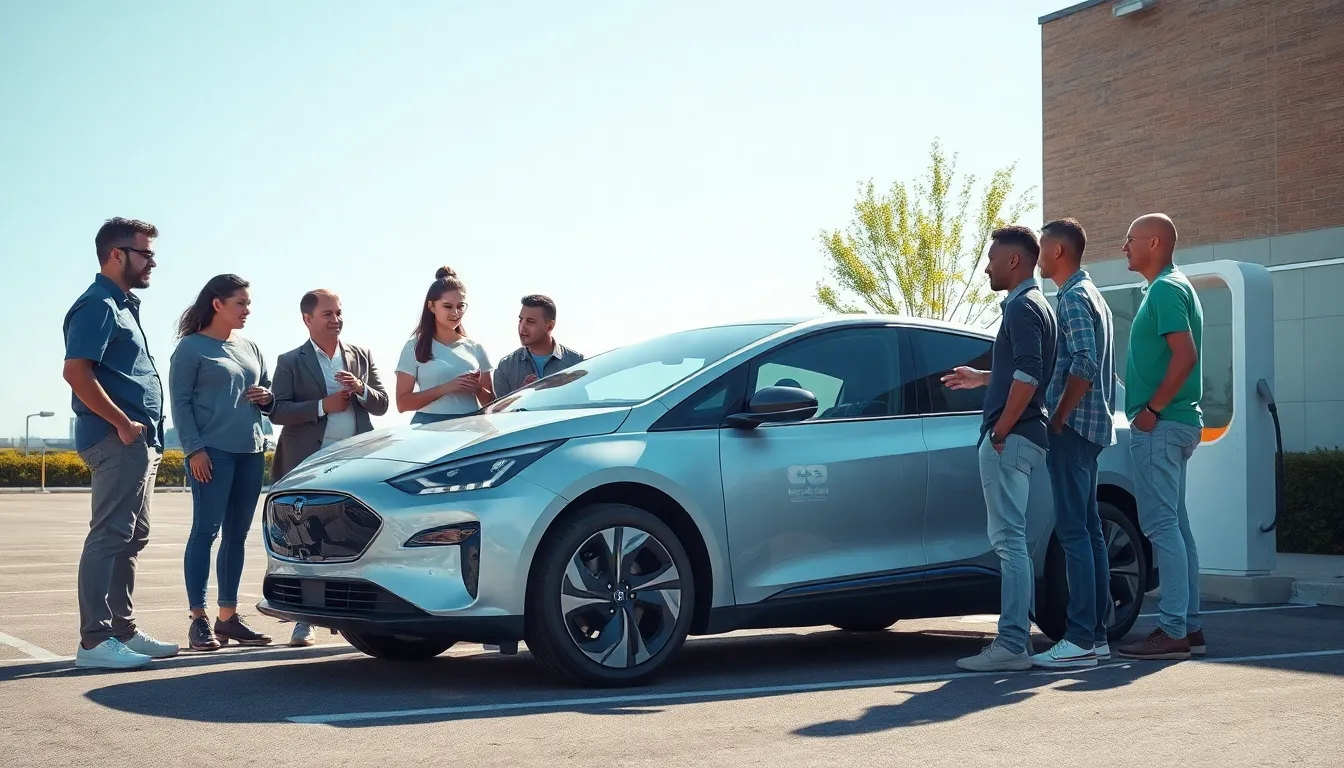As electric vehicles (EVs) gain popularity, understanding their warranties becomes crucial for potential buyers. Unlike traditional cars, electric cars come with unique components and technology that can impact long-term ownership. This makes it essential to navigate the world of electric car warranties to ensure peace of mind and protection against unexpected repairs.
Many manufacturers offer comprehensive warranties that cover everything from the battery to the electric motor. However, the specifics can vary significantly between brands and models. Knowing what’s included in a warranty can help buyers make informed decisions and safeguard their investment. With the right information, drivers can enjoy the benefits of electric mobility without the worry of unforeseen costs.
Table of Contents
ToggleOverview Of Electric Car Warranties
Electric car warranties play a crucial role in protecting consumers as the market for electric vehicles expands. Understanding the types and coverage can aid potential buyers in making informed decisions.
Importance Of Electric Car Warranties
Electric car warranties offer essential protection against repair costs associated with advanced technology and components. Given the unique nature of electric vehicles, these warranties ensure that buyers receive support for critical parts such as the battery and electric motor. Comprehensive warranties can enhance buyer confidence, knowing that expensive repairs might be covered for several years or miles. Research shows that a well-structured warranty can significantly increase resale value and marketability for electric vehicles.
Key Components Of Electric Car Warranties
Electric car warranties typically include several key components:
- Battery Warranty: Covers defects in battery materials and performance. Many manufacturers offer warranties ranging from 8 to 10 years or 100,000 miles.
- Drive Unit Warranty: Protects against failures in electric drivetrains, which may be covered for the same duration as the battery warranty.
- Comprehensive Warranty: Encompasses various vehicle parts, sometimes including electrical systems and specialized components.
- Corrosion Warranty: Addresses rust or corrosion issues, typically valid for 5 to 12 years, depending on the manufacturer.
- Roadside Assistance: Often included, providing support in case of breakdowns or emergencies, usually up to 3 years or a specified mileage.
Understanding these elements allows buyers to assess the level of coverage and make suitable choices based on their driving habits and vehicle expectations.
Types Of Electric Car Warranties

Electric car warranties generally fall into two main categories: manufacturer’s warranties and extended warranty options. Understanding these types helps consumers choose coverage based on their needs.
Manufacturer’s Warranty
Manufacturer’s warranties typically cover defects in materials and workmanship for a specified period or mileage, whichever comes first. Most electric vehicles offer several types of manufacturer warranties, which include:
- Basic Warranty: Covers standard vehicle components for 3 to 5 years or 36,000 to 60,000 miles.
- Powertrain Warranty: Focuses on essential systems like the electric motor and transmission, often extending up to 8 years or 100,000 miles.
- Battery Warranty: Specifically covers the vehicle’s battery pack, with coverage lasting from 8 years to 10 years or 100,000 miles, depending on the manufacturer.
These warranties provide crucial peace of mind, addressing potential issues related to the vehicle’s advanced electric technology.
Extended Warranty Options
Extended warranty options offer additional coverage beyond the manufacturer’s warranty period. These can be purchased before or after the original warranty expires and generally include:
- Scheduled Maintenance Plans: These plans cover regular maintenance services, such as tire rotations and fluid changes.
- Comprehensive Extended Warranty: This coverage might include all electronic components, battery issues, and powertrain deficiencies, usually expanding coverage for an additional 2 to 5 years or more.
- Third-party Warranties: Various companies provide independent warranties, which can offer customizable terms and coverage based on the vehicle’s age and mileage.
Choosing an extended warranty can provide extra protection for unforeseen repairs as the vehicle ages. Selecting the appropriate warranty ensures drivers are protected throughout their electric vehicle ownership experience.
Comparing Electric Car Warranties
Comparing electric car warranties is vital for making informed purchase decisions. Variations exist in coverage, costs, and benefits among different manufacturers and models.
Coverage Differences
Coverage differences among electric car warranties often stem from manufacturer policies and vehicle specifications.
- Battery Warranty: Many manufacturers offer battery warranties ranging from 8 to 10 years or 100,000 to 150,000 miles. This warranty typically covers defects and capacity loss.
- Powertrain Warranty: This warranty generally covers the electric motor and other essential components. Coverage periods can vary but often last between 5 to 8 years.
- Comprehensive Warranty: Some manufacturers provide comprehensive warranties that cover nearly all vehicle components including electrical systems and infotainment features, typically for 3 to 5 years.
- Corrosion Warranty: Corrosion warranties address rust and corrosion issues, often lasting 5 to 7 years.
- Roadside Assistance: Many warranties include roadside assistance for a specified time, often for 3 years or 36,000 miles, covering towing, battery jump-starts, and flat tire changes.
Understanding these differences enables buyers to evaluate which warranty aligns with their needs.
Costs And Benefits
Costs and benefits of electric car warranties vary significantly based on coverage options and vehicle models.
- Cost Range: Manufacturer warranties are typically included in the purchase price, while extended warranties may cost between $1,000 and $3,000, depending on coverage duration and components included.
- Battery Replacement Benefits: Battery replacement costs can exceed $5,000, making a robust warranty essential. Coverage for this component ensures financial protection against costly repairs.
- Increased Resale Value: A comprehensive warranty can enhance resale value, as many buyers prioritize vehicles with existing warranties for peace of mind.
- Peace of Mind: Extended warranties provide continued coverage post-manufacturer warranty expiry, reducing anxiety over potential repair costs.
Evaluating these costs and benefits aids consumers in choosing the most suitable warranty for their electric vehicle.
Common Misconceptions About Electric Car Warranties
Many misconceptions surround electric car warranties, leading to misunderstandings among consumers. Clarity on these issues helps buyers make informed choices.
Myths Versus Facts
- Myth: Electric car warranties are shorter than traditional car warranties.
Fact: Many electric car warranties match or exceed the warranties of traditional vehicles. Most manufacturers offer battery warranties of 8 to 10 years, comparable to or longer than many conventional warranties. - Myth: Warranties don’t cover battery degradation.
Fact: Most warranties include provisions for battery performance, ensuring consumers receive replacements if their battery capacity falls below a certain threshold within the warranty period. - Myth: Extended warranties are unnecessary for electric cars.
Fact: Extended warranties provide additional security, covering repairs for components less likely to be included in standard warranties, enhancing long-term protection. - Myth: Warranties cover all repairs without limitations.
Fact: Warranties often come with specific terms, outlining what is and isn’t covered, making it crucial to review coverage details.
Understanding Coverage Limits
- Limitations on battery coverage:
Coverage typically guarantees battery performance for a specific period or mileage but may exclude issues from accidents or improper maintenance.
- Powertrain duration:
Powertrain warranties generally cover key components like electric motors and transmissions but can vary by manufacturer, usually lasting 5 to 8 years.
- Corrosion and rust coverage:
Some warranties include corrosion protection, but conditions may apply, ensuring buyers understand potential exclusions.
- Roadside assistance specifics:
Roadside assistance plans included in warranties may offer services like towing and battery jump-starts, but the extent of this support can differ among brands.
- Transferability of warranties:
Some manufacturers allow warranty transfer to new owners, which can enhance resale value, while others may have restrictions in place.
Understanding these misconceptions and limits allows consumers to navigate electric car warranties more effectively, ensuring they select a coverage plan that meets their needs.
Navigating the world of electric car warranties is essential for anyone considering an EV. With the unique technology and components involved it’s crucial to understand the coverage options available. By comparing different warranties and knowing what each one entails buyers can protect their investment and enjoy the benefits of electric driving.
A well-chosen warranty not only provides peace of mind but also enhances the overall ownership experience. As the electric vehicle market continues to grow staying informed about warranty specifics will empower consumers to make confident decisions. This knowledge ensures they can embrace the future of mobility without the worry of unexpected repair costs.
